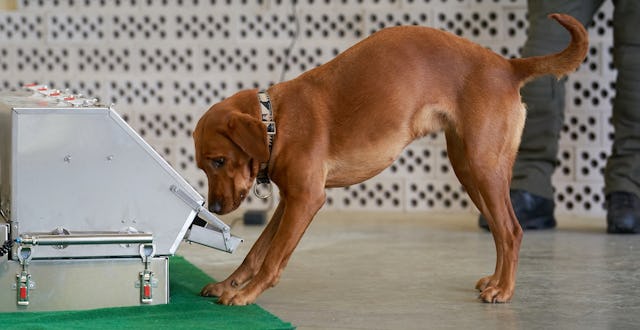Researchers Are Training Dogs To Sniff Out COVID-19 Infections

Can dogs help alleviate some of the backlog, supply shortages, and limited capacity for COVID-19 testing?
Months into the pandemic and with cases rising to truly alarming levels in nearly half of all U.S. states, our country still faces a shortage of tests and supplies needed to diagnose COVID-19 on the large scales that are necessary. Reports in some cities say tests take up to three weeks to come back, and things aren’t much better in some other states where testing supplies have run out and labs are at full capacity processing tests. We need a better way to diagnose the coronavirus. Could man’s best friend be the key to that?
Researchers at a veterinary university in Hannover were able to train dogs to accurately identify COVID-19 just by sniffing patients. And the best part of this? It only took those good boys and girls a few days to learn how to identify the disease.
The study was published last week in the medical journal BMC Infectious Diseases. Researchers at the University Veterinary Medicine Hannover worked with eight dogs from the German armed forces. After just five days of training, the dogs were able to sniff the saliva of 1,000 people — both healthy and infected with COVID-19 — and identify the virus with a staggering 94 percent accuracy.
“We think this works because metabolic processes in the body of a diseased patient is completely changed, and we think that the dogs are able to detect a specific smell of the metabolic changes that occur in those patients,” Professor Dr. Maren Von Köckritz-Blickwede explained about the study in a video she published to YouTube.
Dr. Holger Volk, another one of the researchers who worked on the study, says this likely works because dogs have such a stronger sense of smell than humans.
“We know for a very long time that dogs have been used in a lot of walks of life, but for medical detection, it’s a novel at the end of the day,” Volk said. “People have not really realized the potential a dog could have to detect diseased from non-diseased patients.”
The next step in this study is to train the dogs to identify COVID-19 specifically. At this point, researchers think they can only identify diseased saliva, and might not be able to tell the difference between a patient who has the coronavirus, and one who has another illness like the flu. But if they succeed, this could be a key way to address testing shortages, as well as prevent coronavirus outbreaks at airports and public events. Plus, seeing a doggo instead of getting a nasal swab? Sign us right up for that future.